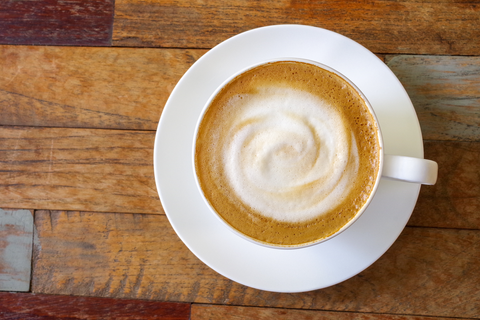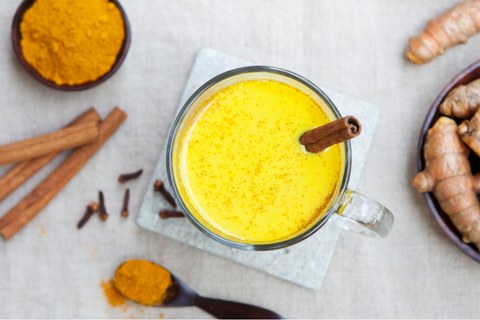
Quick Look
Anxiety disorders are the most common mental illness in the United States, affecting about 40 million adults. And while anxiety is often treated with therapy and medication, understanding the link between diet and anxiety can also be a powerful tool for managing your mental health. Just as there are foods that reduce anxiety, there are also foods that cause anxiety. These are the best and worst foods for anxiety.
Before We Begin: Take the Stress Out of Mealtime with MamaSezz Get Me Started Bundle

Reap the benefits of a plant-based diet without all the work and get fresh and delicious plant-based meals for beginners delivered to your door. No cooking, no meal prep, no mess. Just heat and eat. Get started with MamaSezz now. WFPB style.
On This Page
What Is Anxiety
What to Eat: 7 Foods That Reduce Anxiety
What to Avoid: 5 Foods That Cause Anxiety
Key Takeaways
What is Anxiety
Anxiety, while never pleasant, is a normal response to stress. It’s your body’s way of saying there might be some danger ahead. We all feel anxious now and again. But an anxiety disorder is different from occasional anxiety. Anxiety disorders are marked by excessive fear or worry that lasts 6 months or longer and can really feel like it’s taking over your life.
The good news is, whether you’re feeling anxious from time to time, or struggling with an anxiety disorder, fueling your body with the right foods can help you to manage your mental health.
What to Eat: 7 Foods That Reduce Anxiety
1. Brazil Nuts
High in selenium, a powerful antioxidant that helps to reduce inflammation, which in turn prevents disease, slows aging, and even reduces symptoms of depression and anxiety. (Bonus: eating selenium-rich foods, like brazil nuts, is great for your skin and helps to prevent premature wrinkling and skin sagging.)
And it’s super easy to get your recommended daily value of selenium from brazil nuts -- just one nut provides 174 percent of your DV.
Note: Over-consuming selenium can lead to selenium toxicity, so do not exceed 1 brazil nut a day.
2. Dark Leafy Greens

Dark leafy greens are another antioxidant-rich food that reduces anxiety. In addition to calming inflammation, leafy greens like spinach, kale, and Swiss chard also are high in magnesium. Why does that matter? Well, studies show that a diet low in magnesium can increase your risk for anxiety, which makes sense since magnesium has a key role in regulating our neurotransmitters, the molecules used by our nervous system to send messages throughout the body and brain.
Don’t love leafy greens? No worries. There’s a hack for that! Here are some delicious ways to sneak leafy greens into your diet.
3. Tempeh
Gut health and mental health are closely tied. The gut, which is often called our second brain and is where 80% of our immune system resides, needs lots of good bacteria to thrive. Probiotics are foods that contain live microorganisms (caused by fermentation) to promote the growth of that good bacteria, or normal microflora, in your gut.
While greek yogurt is a popular probiotic-rich food, you can get your probiotics without the inflammatory effects of dairy. This is where tempeh and other plant-based sources of probiotics come in.
Similar to the more well-known tofu, tempeh is made from soybeans. But unlike tofu, tempeh has a nutty flavor and meat-like firm texture, which means when it comes to tempeh vs tofu, the former may win meat eaters over more. Like tofu, tempeh takes on the flavor of the ingredients it’s cooked in. And its chewy firm texture makes it super versatile.
Never made tempeh at home before? Here are three easy ways to prepare tempeh (including tempeh bacon!).
4. Avocados
That morning avocado toast may help you find the calm, thanks to all the stress-relieving B vitamins in your avocado. Vitamin B6 may be particularly important for beating anxiety, as it helps the body make serotonin, the neurotransmitter that regulates mood.
Looking for a new way to enjoy avocado? Try this easy vegan chocolate avocado pudding for a healthy dessert.
5. Pumpkin seeds

De-stress by snacking on pumpkin seeds. They’re high in potassium, which can help reduce symptoms of stress and anxiety, as well as regulate electrolyte balance (making it a great snack for athletes, too) and keep blood pressure in check. Pumpkin seeds are also high in zinc, which helps keep your immune system strong!
Snack on pumpkin seeds raw, add them to your oatmeal, garnish your favorite soups, toss them in your Buddha Bowl, or enjoy them with MamaSezz Quinoa Stack.
6. Turmeric
Turmeric is an edible root that is commonly used as a spice in Asian cooking. Curcumin, the active compound in turmeric, is anti-inflammatory and has long been used as a natural remedy for everything from bloating to arthritis. And recently, studies have found links between curcumin and reduced feelings of anxiety and depression.
Want to add turmeric to your diet? Enjoy this easy, delicious, and caffeine-free vegan turmeric latte as part your evening ritual. Or kick off the day with turmeric by enjoying our hearty MamaSezz Breakfast Scramble, made with turmeric-spiced chickpeas!
7. Chia Seeds

Omega-3 is a long-chain fatty acid that’s known to boost mental health and slow cognitive decline. And contrary to popular belief, you don’t need to eat fish to get your omega-3s -- you can get plenty from plant-based sources like chia seeds. About 2 tablespoons of chia seeds a day will suffice.
Not sure how to eat chia seeds? Here are 7 easy chia seed recipes to whip up at home, from chia seed pudding to lemon garlic salad dressing.
What to Avoid: 5 Foods That Cause Anxiety
1. Alcohol

While many like to “unwind” with a drink, alcohol isn’t doing you any favors if you struggle with anxiety. Since alcohol is a depressant it can feel like a drink calms your nerves, but because alcohol changes the levels of serotonin and other neurotransmitters in your brain, anxiety can actually feel heightened once your blood alcohol content returns to normal.
Like to have a nightcap? Keep your ritual but swap the alcohol for one of these 10 immunity-boosting mocktails instead.
2. Coffee

Coffee has plenty of nutrients, from several B vitamins to manganese and potassium. It's even been touted as the biggest source of antioxidants in the Western Diet (though this is likely because the Standard American Diet doesn't consist of all that many antioxidant-rich fruits and vegetables).
But if you struggle with anxiety, you may want to reconsider that morning cup of Joe. Coffee can increase stress in the body because it increases stress hormones called catecholamines. Too much coffee can lead to overstimulation and anxiety. And some people with a specific variant of the CYP1A2 gene metabolize coffee more slowly than others, which makes coffee's effect more intense and can cause jitters and anxiety even in low doses.
Not sure how to replace it? Try these 5 healthy vegan alternatives to coffee or the MamaSezz Cacao Maca Magic Mix. With less caffeine than a normal cup of coffee, this superfood mix also contains herbs, spices, and calming properties like ashwaganada to help give you an even calm, without the spike and crash.
3. Refined Sugar

Sure, indulging in a treat may help you feel better for a little bit, but shortly thereafter you could be left feeling worse. Why? Refined sugar is absorbed quickly in our bloodstream, which gives us a quick boost of energy. But then your body has to up its insulin production to get all that sugar out of your bloodstream, which leaves you feeling crappy in the end.
The good news is you can satiate your sweet tooth without refined sugar with these helpful hacks. Or instead, try a MamaSezz Not-A-Cookie that is refined-sugar free!
4. Processed Foods
While convenient, processed foods can wreak havoc on our physical and mental health. High in sodium, refined sugar, and preservatives, a diet heavy in processed food is linked to chronic inflammation and consequently, increased risk for depression and anxiety.
Need healthy whole food munching ideas? Here are 10 healthy plant-based snacks to reach for instead of potato chips.
5. Dairy
Like sugar and processed foods, dairy is inflammatory. And research shows it may be especially wise to avoid dairy products if you struggle with anxiety and depression as it can make them both worse.
While going dairy-free may be hard to imagine for the cheese lovers out there, you don’t have to feel deprived. You can still enjoy delicious creamy dishes, without dairy and your body will thank you (THIS is what happens to your body when you go dairy-free!).
Key Takeaways
- While many factors contribute to mood and anxiety, a diet filled with whole plant-based foods that reduce anxiety can help many.
- Just as foods can help your symptoms, there are foods that cause anxiety, as well. It’s best to avoid alcohol, refined sugar, coffee, processed foods, and dairy if you struggle with anxiety.
- Want to eat tasty whole plant-based meals but don’t have time to meal prep? Make mealtime easy by getting healthy food, delivered to your door from MamaSezz.
Updated 12/22/21
**
By Ali Brown
Ali is a mom, wife, and nutrition and lifestyle writer and editor. She has her Plant-Based Nutrition Certificate from the T. Colin Campbell Center for Nutrition Studies.





